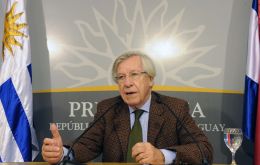MercoPress. South Atlantic News Agency
Economy
-
Tuesday, July 23rd 2019 - 15:14 UTC
Finland's UPM will construct a second 2.1 million ton pulp mill in Uruguay

Finland's UPM on Tuesday made the investment decision to construct a 2,1 million ton eucalyptus pulp mill near Paso de los Toros in central Uruguay.
-
Tuesday, July 23rd 2019 - 09:55 UTC
All ready for Boris Johnson to attempt to overcome the Brexit hurdle

Ballots closed in the race to become Britain's next prime minister on Monday, with the favorite Boris Johnson facing more defections by ministers over his Brexit plan. The country's new leader will take the reins this week and have just three months to attempt to resolve a three-year Brexit crisis that could damage economies on both sides of the Channel and determine the fate of generations of Britons.
-
Tuesday, July 23rd 2019 - 09:40 UTC
UK pound down on fears of Johnson PM and a no deal exit from the EU

Expectations of policy easing by major central banks such as the Federal Reserve propped up global stocks on Tuesday, while the pound sagged as Britain braced for a new prime minister who could pave the way for a no-deal exit from the European Union.
-
Monday, July 22nd 2019 - 09:49 UTC
Chinese investment in the US plummeted 88% since Trump took office

Growing distrust between the United States and China has slowed the once steady flow of Chinese cash into America, with Chinese investment plummeting by nearly 90% since President Donald Trump took office.
-
Monday, July 22nd 2019 - 09:20 UTC
China launches its 'Nasdaq' technology board in Shanghai on Monday to compete with tech rival US

Trading begins on Monday (July 22) on a new Nasdaq-style technology board in Shanghai that represents one of China's most significant market reforms, and a potential weapon in its growing tech rivalry with the United States.
-
Saturday, July 20th 2019 - 18:05 UTC
Buzz Aldrin, second human to walk on the moon, tells Trump he is disappointed with current lunar agenda

When President Donald Trump asked Buzz Aldrin, the second human ever to walk on the moon, what he thought about the United States' current ability to operate in space 50 years after the Apollo 11 mission, the ex-astronaut had a ready response.
-
Saturday, July 20th 2019 - 09:50 UTC
Strong contraction of Uruguay's economy: GDP forecasted to grow 0.6% this year

Uruguay's Economy minister admitted on Friday that the country will end 2019 with a “very modest growth”, in the range of 0.6%, but was confident the economy would pick up in 2020 when the construction of a new pulp mill, with an investment of at least two billion dollars, is scheduled to start.
-
Saturday, July 20th 2019 - 08:11 UTC
UK Full-blown recession in a no deal exit from the EU?

Britain might be entering a full-blown recession that a no-deal exit from the European Union would compound, blowing a 30 billion-pound hole in the public finances, a budget watchdog said. The Office for Budget Responsibility said the economy probably flat-lined or might have contracted in the second quarter.
-
Friday, July 19th 2019 - 09:57 UTC
Falklands' government and fishing industry reject MLA Spink's 'breezy' Brexit

The impact of Brexit on the Falkland Islands' fishing industry could be “significant” according to the fishing industry, contradicting lawmaker MLA Roger Spink’s view in last week's Penguin News that there were measures that could be undertaken to mitigate the impact of potential tariffs.
-
Friday, July 19th 2019 - 09:55 UTC
Loans from Russia and China to Venezuela will be renegotiated through the Paris Club, says Guaidó

Loans to Venezuela from President Nicolas Maduro's allies Russia and China would be renegotiated through the Paris Club if Maduro leaves power, an advisor to the opposition said, responding to concerns about favorable treatment for the two countries.
